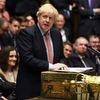Air Pollution Funding Insufficient to Ensure Clean Air for Everyone

The air quality funding measured in the report backed projects from technology to measure levels and sources of air pollution, to educational campaigns, fitting scrubbers to industrial chimneys, and introducing cleaner electric buses.
The research showed that loans to improve air quality were far higher than grants, with $2.4 billion going to that purpose in the five-year period, mainly to support activities in China, which launched a major bid to cut pollution.
Matt Whitney of the Clean Air Fund told the Thomson Reuters Foundation that while grant funding had fallen between 2018 and 2019, the overall trend was for it to grow.
While aid may be squeezed due to economic recessions near term, studies have shown how respiratory and heart conditions linked to air pollution make people more susceptible to contracting and suffering severe symptoms of Covid-19, he said.
Read also: People with Pre-Existing Conditions at Higher Risk of Coronavirus in Indonesia
Lockdowns had also revealed the speed with which air quality could be improved with less traffic and industrial activity, making urban areas more livable, he noted.
"There really is an opportunity to tackle this problem. We know what the solutions are, the benefits can be felt immediately, and who doesn't want to have healthier people and cleaner air?" he said.
Desire for change
In a survey conducted by the Clean Air Fund in May and June, at least two-thirds of citizens in Britain, India, Nigeria, Poland and Bulgaria said they supported stricter regulation to tackle air pollution.
In Nigeria and India, more than 90 percent of respondents wanted to see air quality improved in their area.
On Monday, Colombia's capital Bogotá and Rio de Janeiro in Brazil joined 35 other cities worldwide in recognizing breathing clean air as a human right and committing to set targets to cut pollution and implement clean air policies by 2025.
Read also: Greta Thunberg and Young Activists Talk Climate Action with Angela Merkel
“The pandemic taught us that we have to change the way we work, consume and transport ourselves,” said Bogotá Mayor Claudia López.
That meant burning less gasoline and diesel, and walking and cycling more, she added.
Whitney of the Clean Air Fund said spending development aid on cleaner public transport was an efficient use of money because it tackled both air quality and climate change while enabling people to access jobs and services more easily.


































